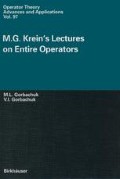Abstract
In this chapter the theory of entire operators developed in Chapter 2 is applied to some classical problems of analysis. The power moment problem is among them. This problem is considered in Section 1. It is shown there that a certain Hermi-tian operator on the appropriate Hilbert space can be associated with it. This operator has a directing functional. It is established that it is entire if and only if the moment problem under consideration is indefinite, i.e. nonuniquely solved. The indefiniteness criteria are found on the basis of the general theory of entire operators presented in the previous chapter. In the case where the problem is indefinite, all its solutions are effectively described. Section 2 deals with positive definite functions. The analogue of the classical Bochner theorem concerning an integral representation of a function positive definite on the whole real axis is proved for a positive definite function given on a finite interval. It turns out that the integral representation of the Bochner type for such a function can be obtained as a special case of expansion in eigenfunctions of a certain Hermitian operator having a directing functional. As opposed to the case of the whole real axis, this representation may be nonunique. In the indefinite case the operator whose deficiency index is (1,1) associated with the given function is entire, and the problem of finding all spectral functions of this operator or all the representations of the given positive definite function, which is the same, is equivalent to the description of all its positive definite continuations to the whole real axis. This problem is constructively solved by using the general theory of entire operators. Both definite and indefinite cases are illustrated by a number of useful examples. The representation and continuation problems for spiral and unitary arcs in a Hilbert space are discussed in section 3. In the case where a continuation of a spiral or unitary arc to a complete spiral or unitary line, respectively, is not unique, all the continuations are described. In contrast to the above problems, the Hermitian operator corresponding to the indefinite continuation problem for a spiral arc is entire with respect to a generalized not ordinary gauge. In this connection the general theory of such operators sketched in section 2.9 is used for solving the problems being considered.
Access this chapter
Tax calculation will be finalised at checkout
Purchases are for personal use only
Preview
Unable to display preview. Download preview PDF.
Author information
Authors and Affiliations
Rights and permissions
Copyright information
© 1997 Springer Basel AG
About this chapter
Cite this chapter
Gorbachuk, M.L., Gorbachuk, V.I. (1997). Applications of Entire Operator Theory to Some Classical Problems of Analysis. In: M.G. Krein’s Lectures on Entire Operators. Operator Theory Advances and Applications, vol 97. Birkhäuser, Basel. https://doi.org/10.1007/978-3-0348-8902-5_3
Download citation
DOI: https://doi.org/10.1007/978-3-0348-8902-5_3
Publisher Name: Birkhäuser, Basel
Print ISBN: 978-3-0348-9821-8
Online ISBN: 978-3-0348-8902-5
eBook Packages: Springer Book Archive

